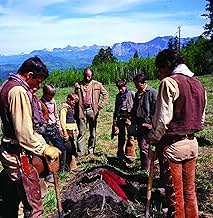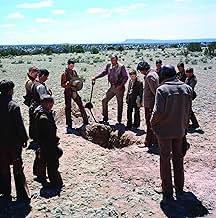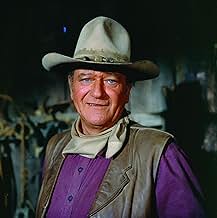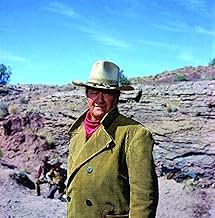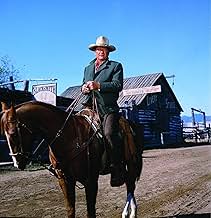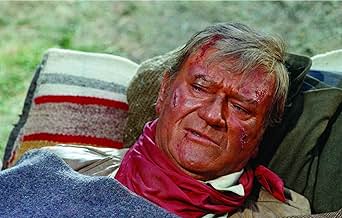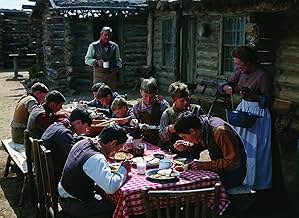Adicionar um enredo no seu idiomaRancher Wil Andersen is forced to hire inexperienced boys as cowhands in order to get his cattle herd to market on time but the rough drive is full of dangers and a gang of rustlers is trail... Ler tudoRancher Wil Andersen is forced to hire inexperienced boys as cowhands in order to get his cattle herd to market on time but the rough drive is full of dangers and a gang of rustlers is trailing them.Rancher Wil Andersen is forced to hire inexperienced boys as cowhands in order to get his cattle herd to market on time but the rough drive is full of dangers and a gang of rustlers is trailing them.
- Direção
- Roteiristas
- Artistas
- Prêmios
- 1 vitória no total
- Weedy - Cowboy
- (as Norman Howell Jr.)
- Charlie Schwartz - Cowboy
- (as Stephen Hudis)
Avaliações em destaque
"It's not how you're buried, it's how they remember you," Wayne's Wil Andersen tells one of his charges, the half-breed Cimarron (A Martinez), and "The Cowboys" is a two-hour rumination on that theme, of how Andersen, a man whose hard-bitten ways cost him two sons, finds a sort of redemption with these boys who come to help him take his cattle 400 miles to Belle Fourche while the only menfolk are either off panning for gold or else aiming to get their fortune in seedier ways.
John Wayne in his post-Oscar years didn't have much to prove, and many of his movies from that time play today as little more than agreeable trips to the well. "The Cowboys" is different. Picking up on the rougher theme of post-"Wild Bunch" westerns, it presents a modern sensibility where people swear and bleed profusely when shot or punched. Wayne might seem out of place, yet he finds the right balance here between his characteristic latter-day gruff humorousness and the sterner stuff we remember from his classic turns in "Red River" and "The Searchers".
The key to Andersen are those dead sons he has buried out in his spread back home. "They went bad on me," is about all he can say on the matter. "Or I went bad on them. I can't figure it out." Seen through that prism, everything Andersen does with his young cowboys makes a lot of sense, right down to the famously grim finale with Bruce Dern, whose memorable "Long Hair" is one of the great Wayne-movie villains.
But there's a lot of joy in "The Cowboys", too. Another scene early on, just as classic, has Andersen deciding to give the boys a lesson with a wild mare, Crazy Alice, only to get taught a lesson in turn by these surprisingly spry youngsters, who each manage to prove themselves to Wil's wry chagrin.
"I hope I haven't ridden all the rough off her!" one offers as he hands back the reins.
"You'll do," Wil replies, about all the affection he gives or they want.
Then there's Jebediah Nightlinger, the cook and only other adult figure on the scene, who tries less hard than Wil to hide his enjoyment of the situation. Hard as it is to imagine "The Cowboys" without Wayne, it's harder to imagine it without Roscoe Lee Browne, whose every utterance has a quality of burnished bronze.
Director Mark Rydell finds the right tempo and look for his film, aided by John Williams' stirring score and Robert Surtees' camera work. Every shot has the quality of a glossy Louis L'Amour cover, majestic pines and grassy hills stretching out into infinity.
About the only thing keeping "The Cowboys" from classic status is an ending which, while satisfying, comes off very pat on reflection. Despite the long time we spend with them, many of the Cowboys themselves lack for individuality, an exception being Robert Carradine, who plays Slim the de facto leader of the kids, and is the real-life son of Wayne's "Stagecoach" co-star John Carradine.
"The Cowboys" wasn't Wayne's swansong, yet it's a stirring valedictory effort all the same, a chance to see an enduring screen legend at his late and glorious apex, showing a new generation, and generations yet unborn, a thing or two about getting it done.
There's plenty of scenic splendor in vivid Technicolor, a rousing western score by John Williams, and the cast of youngsters all give solidly natural performances under Mark Rydell's direction.
Outstanding work by ROSCOE LEE BROWNE as the black cook on the chuck wagon who knows how to deal with a bunch of rambunctious boys, and with an instinct for knowing when not to trust them with mischief. He plays a key role in the story and he's terrific.
Plenty of other good character roles are filled by BRUCE DERN, as the principal villain whose sadistic scene with a young boy is enough to curl your hair, and COLLEEN DEWHURST as the wise madame on the road with her girls.
The story hooked me from the start, kept me interested all the way through and only veered into tougher territory during the last forty minutes or so with the brutal showdown between Wayne and Dern. And then it moved briskly, taking an unexpected twist toward the last fifteen minutes.
Summing up: An overlooked gem and one of JOHN WAYNE's best movies. He gives a performance of true grit--and so do the boys!!
The reasons I watch this show repeatedly are two of my favorite fellows: Roscoe Lee Browne and John Williams. Roscoe Lee Browne is able to sell lines that simply wouldn't work coming from somebody else (his dialogue with Coleen Dewhurst is priceless), and he is the unique feature that makes this film work. He graciously shares the screen with his co-actors as necessary, but he easily walks off with the movie nonetheless. John Williams' fantastic score could stand alone; though it is occasionally a little too cheery for the moment (after all, this is a pretty gruesome film, if you really think about it), it covers all the bases of the movie. Youthful innocence, becoming men, sorrow, success -- it's all right there in the score. Don't expect Star Wars music; frequently understated, the music carries a supporting role. As both John Williams and Roscoe Lee Browne displayed here, it is often the supporting actors that make the show a success!
Ever since his Oscar in True Grit, Wayne began playing men of his own age in his films and a common thread seemed to be imparting values to the next generations whether they wanted them or not. You can see that readily in films like Rio Lobo, Big Jake, Chisum, The Train Robbers, and Cahill, U.s. Marshal. Most especially in The Shootist with Ron Howard as his pupil.
But in The Cowboys he had a mess of pupils. Wayne's a hardworking rancher whose hands have deserted him because of a rumored gold strike. He has to get his cattle to market, so out of desperation he hires a bunch pubescent and pre-pubescent youngsters from the town.
The trail drive is quite the lesson for these kids. They learn about life that it is about hard work, responsibility, and keeping your given word. Wayne gets a second chance at fatherhood, he didn't do such a good job of it with his own two sons. More like grandfatherhood at his age, but the kids learn well.
Along as a second role model is Roscoe Lee Browne. Possessor of one of the greatest speaking voices in the English speaking world, Browne is the first black man they've ever met. In fact one of the kids uses the "N" word when first meeting him, out of ignorance more than racism. Browne sets them straight by example more than preaching.
The oldest two kids, A Martinez and Robert Carradine, have gone on to some considerable adult careers which they are still enjoying. All the kids are a winning bunch however.
A couple of the Duke's later westerns like The Train Robbers and Cahill I found to be flawed. Not so here. Director Mark Rydell keeps this one going at a good pace and does wonders with his cast of all ages.
Você sabia?
- CuriosidadesRoscoe Lee Browne was urged by his friends not to work with the right-wing John Wayne. He ignored them and the two actors refrained from discussing politics during filming.
- Erros de gravaçãoWhen Andersen sends one of the boys back to find Mr. Nightlinger, he is riding a pale Appaloosa. He rides ahead to talk to another boy, but is now riding a red sorrel.
- Citações
Jebediah Nightlinger: [praying to God before he's about to hanged by Long Hair and his gang] I regret trifling with married women. I'm thoroughly ashamed at cheating at cards. I deplore my occasional departures from the truth. Forgive me for taking your name in vain, my Saturday drunkenness, my Sunday sloth. Above all, forgive me for the men I've killed in anger
[eyes shifting to Long Hair]
Jebediah Nightlinger: ... and those I am about to.
- Versões alternativasWhen the film was originally released in the UK it carried a 'AA' rating, preventing an under-14 year old audience from seeing the movie. When the distributors asked the UK censor if this could be changed he suggested removing the scene with the wagon full of prostitutes, thus deleting Colleen Dewhurst's entire role in the film, and in doing so the film was re-certified with an 'A' rating (suitable for all). Additionally cuts were made to tone down some of the more violent scenes including the fight between Wil and Long Hair, the shooting of Wil, and a man being dragged by his horse. Later cinema showings and all video versions restored the Colleen Dewhurst scene but retained the violence cuts (totalling 1 min 30 secs). For the upgraded 12-rated 2005 DVD the film was passed fully uncut.
- ConexõesFeatured in The Breaking of Boys and the Making of Men in 'The Cowboys' (1972)
- Trilhas sonorasThe Star Spangled Banner
(uncredited)
Music by John Stafford Smith
Lyrics by Francis Scott Key
Sung by school children
Principais escolhas
- How long is The Cowboys?Fornecido pela Alexa
Detalhes
Bilheteria
- Orçamento
- US$ 6.000.000 (estimativa)
- Tempo de duração2 horas 14 minutos
- Proporção
- 2.39 : 1


